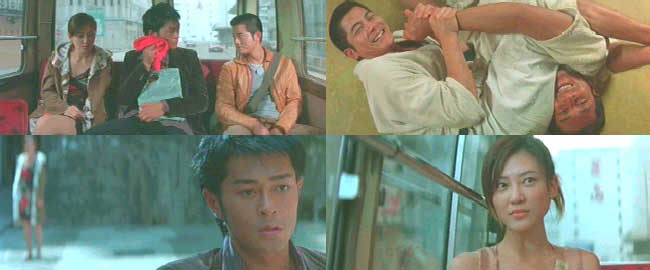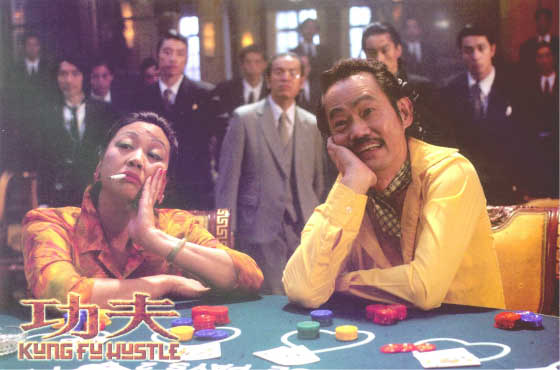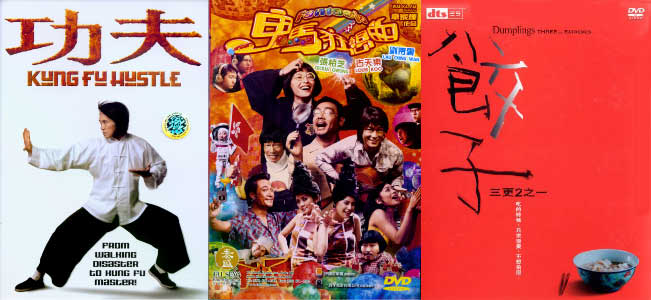

The 2004 Hong Kong movie year began optimistically for me with “Fantasia” and ended on an even higher note with “Kung Fu Hustle”. In between checking out that which ended up being my 2nd favorite film from the HKSAR and top pick of that territory’s 2004 releases, I also managed to find and viewed a fair number of other Hong Kong cinematic offerings which did entertain, impress and/or provide considerable food for thought (For the record, I’ve watched a total of 39 2004 Hong Kong movies to date; and among those works which I found worthwhile enough -- and would rate on the brns.com scale as a 7 or higher -- yet ended up not making it on to this Top Ten list are: “Love Battlefield”, “Breaking News”, “A-1”, “Love on the Rocks” and “McDull: Prince de la Bun”).





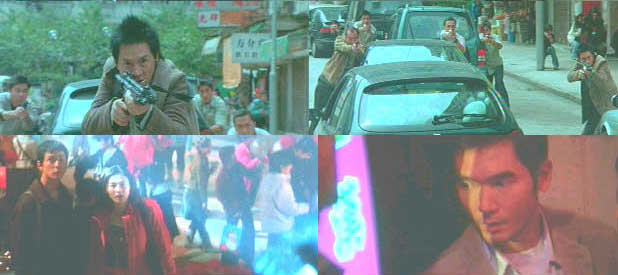
Now, on to...
My picks (as of early March, 2005, and without
having viewed yet such as Mak Yan-Yan’s “Butterfly” and Yon Fan’s “Colour
Blossoms”):-
The top grossing film of all time -- not just
the famously fallow year that’s been 2004 -- at the HKSAR box office.
And what a masterfully crafted movie this genre-transcending work happens
to be. Featuring memorable performances by the likes of Yuen Qui,
Yuen Wah and Leung Siu Leung along with director and co-scriptwriter cum
lead actor Stephen Chow, great action choreography and direction (largely
by Yuen Woo Ping but maybe also benefiting from Sammo Hung’s early involvement),
inspired referencing of past Hong Kong movies (including “The House of
72 Tenants” along with kung fu works like “Buddha’s Palm”), a truly wonderful
marrying of a diverse range of special effects with live human action,
etc., etc. Admittedly, I actually didn’t find it as funny as “Shaolin
Soccer”. However, this should in no way be taken to mean that I think
that this extremely entertaining 2004 offering is the lesser film.
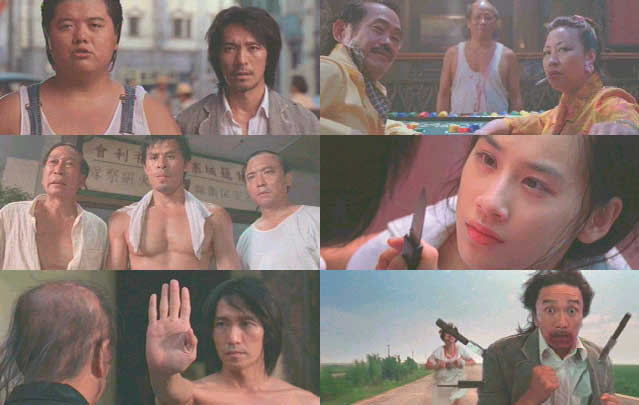
This Milkyway Image production -- which pays
tribute to distinctively Hong Kong personalities like the Hui brothers
(Michael, Sam and Ricky) and Lam Ah Chun (AKA Plain Jane) as well as indiscriminately
spoofs the foreign likes of Harry Potter and “Jurassic Park” plus makes
good use of the Canadian-Vietnamese-Chinese Christy Chung’s multi-lingual
abilities! -- is an ultra zany guffaw fest with a sense of reckless comedic
abandon, and feeling of imagination run wild. In keeping with the
tradition of Chinese New Year comedies, it’s certifiably silly. At
the same time, however, I also see it being so in a way that manages to
joyously show that abundant creativity still exists, and looks to be positively
encouraged, (with)in the cinema of Hong Kong.
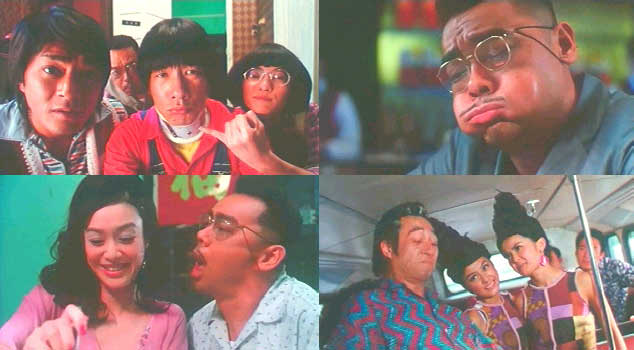
Okay. I should have known to trust that
this substantive as well as stylish work -- the extended stand-alone version
of one of a trio of Pan-Asian short films that was released together as
the feature length “Three...Extremes” -- could have been nothing but a
quality offering. After all, it was directed by Fruit Chan, produced
by Peter Chan, scripted by Lillian Lee, and shot by Christopher Doyle and
Cheng Siu Keung (various Milkyway Image movies). But never in my
wildest dreams could I have expected that a movie which prominently features
the consumption of fetuses could actually make for such engrossing as well
as thought-provoking viewing! And feature a thoroughly spellbinding
performance by the infamous Bai Ling plus a very respectable one by Miriam
Yeung (along with yet another capable one by the butt-bearing once more(!)
Tony Leung Kar Fai).
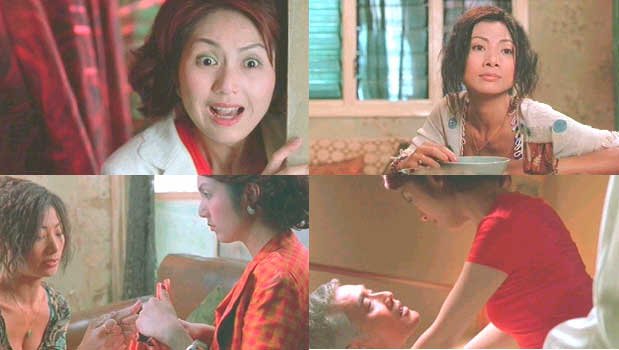
Jackie Chan’s darkest and most intense film
since “Crime Story” (1993) also looks to be his best by far since “Drunken
Master II” (1994). This is due in no small part to the now over 50-year-old
action star showing that he really remains capable of performing gasp-inducing
stunts and eye-catching martial moves. At the same time though, his
Young Turk co-stars (notably Nicholas Tse and Daniel Wu -- and 2004 HKFA
Best Newcomer Awardee Andy On in one particular fight scene) capably play
their part as well in a familiar faces-filled effort which has been described
as a portrayal of how the glorious older generation fears the wilder younger
generation but continues to nurse hopes that some of these new kids around
the block will gratefully appreciate the efforts of -- and be able to assist,
cooperate with, and even inspire -- their elders.

Five years in the making (and maybe still being
re-edited for a Director’s Cut DVD!), this Wong Kar Wai work was my --
and, I’m sure, many others’ too -- most looked-forward-to movie of 2004.
Consequently, the fact that it didn’t disappoint is already very much to
its credit! As an unexpected plus, this assumed-to-be sequel to “In
The Mood For Love” also turned out in certain significant ways to be the
auteur’s long-envisioned follow-up to “Days Of Being Wild”. So...indulgent
it may be but there’s also no getting away from the feeling that this is
one very personal, hypnotic and atmospheric offering that’s laden with
meaning, connections, associations and emotion. So much so that I’ll
forgive much of Carina Lau and Chang Chen’s efforts having ended up on
the cutting floor along with the over-rated Zhang Ziyi having had more
screen time than the afore-mentioned thespians as well as the beguiling
Faye Wong and the classy Gong Li.

At times, this hard-hittingly tragic film which
won its helmer the Hong Kong Film Critics Society’s Best Director of 2004
prize feels like “Comrades, Almost A Love Story” (Peter Chan’s expertly-told
tale of two Mainlanders who go to Hong Kong to find work but, then, also
find love there) meets Johnnie To in dark crime drama mode (e.g.,
PTU, another movie which took place over a specified time period and in
a specific portion of the Kowloon Peninsula). At the same time, it’s
neither a pale copy nor soul-less clone and also most definitely bears
the hallmarks of a film by Derek Yee: an auteur with the admirable ability
to meld together darkness and light along with two different genres to
create his own substantive, thought-provoking and undoubtedly high quality
movie.
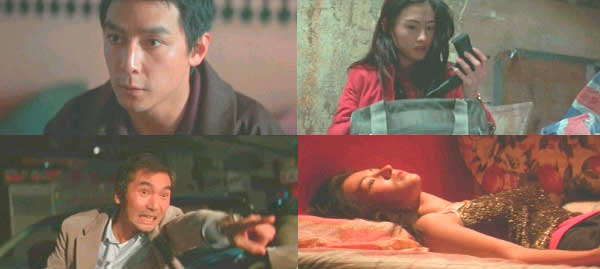
The amazing Sylvia Chang does it again: i.e.,
prove that she truly is the Renaissance woman of (East) Asian -- heck,
maybe even world -- cinema. After all, not only does the multi-faceted
talent direct and co-script this insightful dramedy which revolves around
a trio of interesting women from three different age-groups but she also
co-stars in it along with two talented actress-singers (in the consistently
capable Rene Liu and Angelica Lee Sinje) who she happens to be the agent
for (plus, if truth be told, steal the show away from them and everyone
else)! As well, it seems to be so typical of director Sylvia Chang’s
inclusive efforts that for all of this effort’s tending to be conveniently
categorized as a women’s film, it actually is one in which more than one
male (including those played by Anthony Wong, Tony Leung Kar Fai and Richie
Jen) does get a chance too to show his humanity and appealing sides.
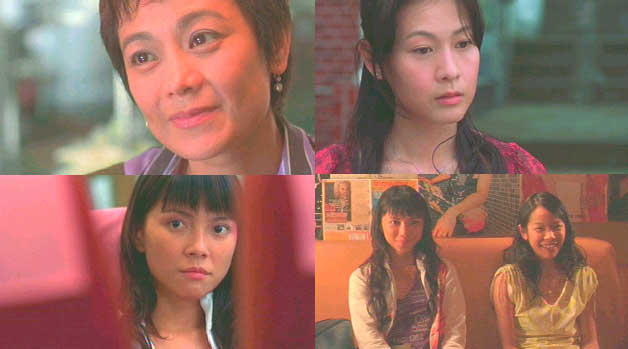
This potent horror cum suspense-thriller saw
the inspired bringing together of two award-winning performers to work
under the aegis of an up-and-coming auteur celebrated for infusing human
sensitivity into any genre he tackles. Angelica Lee and Karena Lam
once again reveal their dramatic prowess with their mesmerizing portrayals
of two very different women who are brought together by twists of fate
over the course of a police investigation. Incidentally, more than
any other movie I viewed in 2004, this heart-pounding film was one whose
conclusion caused me to stay stock still in my theatre seat and needing
to pause plus catch my breath before I could go out to face the not particularly
benign world again! And yes, I’ll also admit that my being one of
those high-strung individuals who was moved to gasp aloud or scream when
viewing certain parts of the Lo Chi Leung helmed work!!
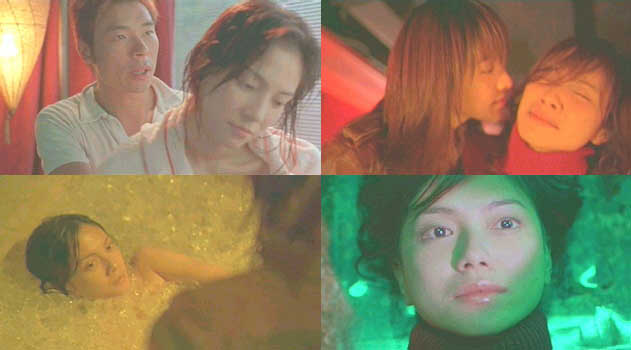
Whether we like it or not, Mainland Chinese-Hong
Kong co-productions increasingly appear to be the order of the day.
In any event, Ann Hui was making movies on the Chinese Mainland decades
ago. And while this latest such work of the female doyen of Hong
Kong cinema has not been as heralded as, say, 1997’s “Eighteen Springs”,
my personal opinion is that this heady as well as artistic action-drama
with a tough and independent, yet emotional and sensitive, moll for a protagonist
actually is qualitatively better plus more populist in nature. All
in all, then, I find it a crying shame that that which could boast of having
a charismatic leading man in Nicholas Tse and a charming main female in
Vicki Zhao Wei was neither all that commercially nor critically well received.
At the same time, I do take some solace from the fact that such as the
local choice of opening film for the 2004 HKIFF are continuing to be made.
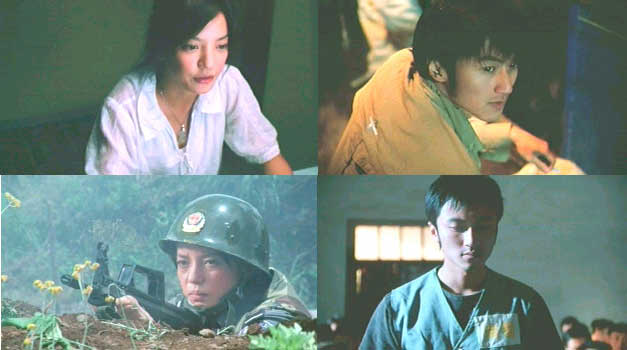
Prolific director-producer Johnnie To dedicated
the most stylish of his trio of 2004 movies to Akira Kurosawa. Still,
there’s no mistaking this quirky judo-themed film for anything other than
a Milkyway Image production. Also, with three leads -- in the “pretty
boy”-ish Louis Koo, fading Sky King Aaron Kwok and the not yet really established
Cherrie Ying -- who can be said to be on the light-weight side, this effort
can appear to lack some substance. However, like its main characters,
the action-packed work turns out to very satisfactorily possess hidden
depth as well as be evocative in a way that not many movies can be.
As such, this offering only provides further proof, if needed after “Running
on Karma”, that Johnnie To is a bonafide auteur as well as a film-maker
who, when he wants to, can make genre works which can thoroughly clean
up at the Hong Kong box office.
